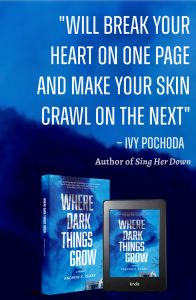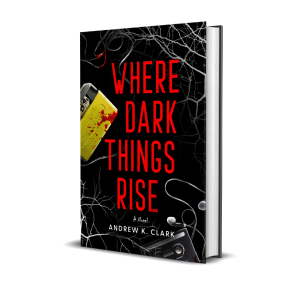 Once again, it’s time for my favorite thing, “Three Questions With…” If you’re interested in signing up for my short-form interview format blog posts, you can do so by signing up here. I encourage you to follow up after doing so with an email, as I don’t get notified when the form gets a ding.
Once again, it’s time for my favorite thing, “Three Questions With…” If you’re interested in signing up for my short-form interview format blog posts, you can do so by signing up here. I encourage you to follow up after doing so with an email, as I don’t get notified when the form gets a ding.
Today’s guest of honor is Andrew K. Clark, a horror author from my very own (adopted) home state of North Carolina. I’ve gotten to know him a little bit through Threads, where you can follow him here. More on that aspect of his writing in a bit. You can also find him on TikTok, Facebook, and Instagram. And now, on to the questions!
Based on what I know about your two books, you have a deep connection to Appalachia. Where does that come from, and how does that inform your stories?

There’s a joke that you can’t ask an Appalachian man a question without getting a story. My people were like that. You could ask my grandfather where the nearest gas station was and you’d get more than you bargained for. You might hear about who owned the gas station previously, or the story of the building itself and the people who built it–where they came from and when they moved away or died.
I come from a long line of storytellers, mostly that oral tradition. My people settled in the Western North Carolina mountains before the Revolutionary War. The landscape is in my bones and it is a character in my work. The magic of the place, its beauty, are important to capture. But the southern writer has an obligation, too, to tell the truth about the ugliness and darkness of our history. I try to capture that: the racism, misogyny, xenophobia, etc. I would also say class is an important topic in my stories as it is part of the struggle of the Appalachian people: who can lay claim to the land, who exploits it, who has the power to shape the future of it.
 You’re a horror author and a horror fan, obviously. What are your top five favorite pieces of horror media, and how have they affected your writing?
You’re a horror author and a horror fan, obviously. What are your top five favorite pieces of horror media, and how have they affected your writing?
Making me pick five is a cruel exercise, but I’ll try (in no particular order) to name works that I see as horror north stars for me:
- The Exorcist (book and film).
- The VVitch (film).
- The Only Good Indians (book, Stephen Graham Jones).
- The Boatkeeper’s Daughter (book, Andy Davidson).
- Lately I am obsessed with the 2017 Estonian film November. It is a stretch to call it horror; it’s more magical realism. It is rich with dark folklore and is a masterclass in mood and atmosphere while excavating grief and loss.
- In the House of the Devil (film).
- Slewfoot (book, Brom).
- The Shining (book and film, which are vastly different but each brilliant in its own way). See, I couldn’t stop at five.
You’re a social media FIEND! I love your Threads account, and that’s how we met. How do you manage to stay on top of social media posts by others, post yourself, and stay productive writing?
I have mixed feelings like most people do. There are times when I am just too online, period. I think my social media persona came from the notion that it felt ridiculous to, as an artist, try to “sell” myself and my art online. I decided to lean into the ridiculousness of it all and just be as weird about it as possible. The risk, of course, is that people will think the self-parody you’re doing means you’re not serious about your work. I would put it this way: I’m deeply serious about my writing and talking about the good books and other art I discover, but my social media “presence” is deeply unserious.
 Connections are important, but I think it’s important for writers to keep the main thing, the main thing. That is to say, I keep a discipline for my work by writing first thing in the morning at 4:30 or 5 a.m. My social media posts are planned around book events or are promotional, but then I enjoy engaging with writers, readers, and other creatives about virtually anything. I figure we’re hanging out and yeah, I could talk about myself all the time, but that would be pretty boring, so I’d rather engage with other creatives talking about their work. Or just have fun connecting with other humans in these strange times. A theme in my work is the notion of found family, and while there are a lot of strangers I interact with online, there are some that I have come to deeply care about and make real connections with. That’s the glass-half-full argument for social media.
Connections are important, but I think it’s important for writers to keep the main thing, the main thing. That is to say, I keep a discipline for my work by writing first thing in the morning at 4:30 or 5 a.m. My social media posts are planned around book events or are promotional, but then I enjoy engaging with writers, readers, and other creatives about virtually anything. I figure we’re hanging out and yeah, I could talk about myself all the time, but that would be pretty boring, so I’d rather engage with other creatives talking about their work. Or just have fun connecting with other humans in these strange times. A theme in my work is the notion of found family, and while there are a lot of strangers I interact with online, there are some that I have come to deeply care about and make real connections with. That’s the glass-half-full argument for social media.
Also, a reminder: you’ll get more inspiration standing in the woods than from any social media post, image, video, or Substack essay. I am outside as much as humanly possible and recommend it for everyone.
Andrew’s books are available in many physical bookstores. In fact, if you follow him on social media, he’s in the midst of a tour for his latest book Where Dark Things Rise. You might be able to buy it directly from him. If not, he supplies us with this order link.
Leave a Reply